
Dec. 21, 2016 – Around this time of year, you see a lot of “best-of-the-year” articles. If anything, these types of year-end roundups give readers a snapshot of the year’s major developments in a given area of interest. Naturally, lawyers are interested in legal stuff.
Since the State Bar of Wisconsin covers major legal developments through various communication channels – Wisconsin Lawyer™, WisBar InsideTrack™, WisBar News, and State Bar section blogs – an article that highlights the year’s top articles will give readers some insight on what unfolded in Wisconsin’s legal world in 2016.
Changes, Developments in 2016
For instance, the Wisconsin Supreme Court adopted several rule changes affecting law practice, most notably mandatory e-filing in circuit courts. Rebecca Bradley won election to a 10-year term on the supreme court in 2016, and Gov. Scott Walker appointed Daniel Kelly to the supreme court to replace Justice David Prosser, who retired in 2016.
Of course, adequate funding for the court system continues to be an issue. Wisconsin Lawyer kicked off 2016 with a feature on how funding impacts court security. InsideTrack also covered how inadequate funding impacts the state’s counties.
The year saw legislative developments: an overhaul of campaign finance laws, changes to the Uniform Partnership Act, adoption of a Digital Property Act, and changes to adverse possession, worker’s compensation, and landlord-tenant laws, to name a few.
Fran Deisinger took over as the State Bar’s president in 2016. Paul Clement, who has argued more than 80 cases at the U.S. Supreme Court, spoke at the State Bar’s 2016 Annual Meeting and Conference in Green Bay. Miranda v. Arizona turned 50, so did Wisconsin Judicare. The state’s Deadman’s Statute, after 158 years, saw its demise.
The State Bar covered all of these legal developments and more, with the help of contributing authors. The task was to choose a number of top articles to highlight.
What makes a top article of the year? The staff editors that manage the State Bar publications applied various criteria in making that determination.
Some articles had a high number of page views on WisBar.org, based on readership stats from Google Analytics. Some articles highlighted a major legal or practice development. Some articles were just really interesting, in the subjective minds of staff editors. And others engendered significant discussion and feedback from readers.
This article includes a list of “top articles,” based on publication, with no rhyme or reason as to ordering. The list is not exhaustive. Certainly, there were many great articles published by the State Bar in 2016 that are not included on this list.
Top Articles in Wisconsin Lawyer
 1. Final Thought: Please Don’t Hug Me (June 2016)
1. Final Thought: Please Don’t Hug Me (June 2016)
Deanne Koll, a shareholder at Bakke Norman S.C. in New Richmond, touched a real nerve and sparked discussion with her “Final Thought” column. She listed things that bother her in a male-dominated work environment.
Topping her list: Don’t hug me. “I think there’s something that tells men that if we’re friends, we can no longer have a vigorous handshake and a large smile to greet each other but must instead have an awkward hug,” wrote Koll, a member of the State Bar’s Board of Governors. “Don’t do it. Unless we’re truly friends outside of the profession, please, spare us both the embarrassment and simply put out your hand to shake.”
This post generated an enormous social media engagement on Facebook. It had more than 25,000 impressions. In other words, the article “went viral.”
 2. Are You Ready? Mandatory E-filing in Effect July 1 (June)
2. Are You Ready? Mandatory E-filing in Effect July 1 (June)
Mandatory e-filing was a major development in 2016. The Wisconsin Supreme Court adopted a new rule that requires certain cases to be filed electronically in circuit court.
The new rule took effect on July 1, with a gradual county-by-county transition. But the plan is that attorneys in all counties will be required to file cases electronically in civil, family, small claims, and paternity cases. Jean Bousquet and Marcia Vandercook, who work for the court system, published this article to make sure attorneys are prepared.
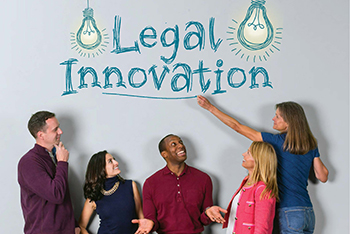 3. 2016 Wisconsin Legal Innovators (November)
3. 2016 Wisconsin Legal Innovators (November)
This article highlighted the year’s top legal innovators, individuals who found new ways to use technology, improve client service, serve new markets, promote workplace diversity, establish marketing/business development strategies, provide pro bono or reduced-cost services, or change internal operations that result in greater efficiency.
“The idea is to showcase innovation in the legal community,” said Tom Watson in the article. Watson is on the State Bar’s Communications Committee, which presents the award. “To us, innovation is a change in the way lawyers typically do things, or a new service or product offering, or a new way to deliver legal services. It runs the gamut.”
Six individuals received the 2016 Legal Innovator award: William Caraher, Rebecca Scheller, Sam Owens, Mary Turke, Colleen Ball, and Sam Strauss.
 4. Up, Up and Away: Rising Legal Regulation of Drone Operation (September)
4. Up, Up and Away: Rising Legal Regulation of Drone Operation (September)
It’s a bird, it’s a plane, it’s … a drone. As Kevin Trost of Axley Brynelson LLP in Madison notes in his article, drones have become a widespread part of private business and recreation and are no longer reserved for military surveillance.
But as drones rapidly increase in commercial and recreational use, the patchwork approach to regulation at the local, state, and federal levels creates confusion. In this article, Trost explains the rise of drones and the different laws that apply to them.
“Ultimately, there is likely to be litigation involving drones that impacts legal issues of trespass and privacy and potentially defines the point at which the federal government’s exclusive jurisdiction over the national airspace commences,” Trost wrote.
 5. In the Crosshairs: Heroin’s Impact on Wisconsin’s Criminal Justice System (January)
5. In the Crosshairs: Heroin’s Impact on Wisconsin’s Criminal Justice System (January)
Brown County Circuit Court Judge Thomas J. Walsh discussed how Wisconsin’s courts are dealing with the heroin epidemic, which caused 199 reported deaths in 2014. Specifically, Judge Walsh discussed treatment courts, including Brown County’s heroin treatment court, and how treatment courts can work to address the heroin problem.
“Some people who go into the treatment courts relapse and will continue to do so,” Walsh wrote. “However, studies comparing the two very different methods by which drug-addict offenders move through the criminal justice system demonstrate that treatment courts work. They benefit the offender because they often lead to recovery. They benefit the criminal justice system because they are more responsive, solve problems, and thereby lift morale.”
 6. A Web of Regulations: Starting a Brewery (March)
6. A Web of Regulations: Starting a Brewery (March)
Jeffrey Glazer, a clinical assistant professor at the University of Wisconsin’s Law & Entrepreneurship Clinic, tells us all we need to know about the laws applicable to starting a brewery in Wisconsin, an area that can get pretty complicated.
“Lawyers are probably not the least bit surprised to learn that beer is highly regulated,” he wrote. “What might surprise you, however, is the tangled web of federal, state, and local laws unique to virtually every single jurisdiction where a brewery might be located.”
 7. Landmark Study: U.S. Lawyers Face Higher Rates of Problem Drinking and Mental Health Issues (February)
7. Landmark Study: U.S. Lawyers Face Higher Rates of Problem Drinking and Mental Health Issues (February)
The first empirical study in 25 years confirmed that lawyers have significant substance abuse or mental health problems, more so than other professionals or the general population. Significantly, younger lawyers are the ones struggling the most. And the study also found that most lawyers are not getting help, for the wrong reasons.
In this article, State Bar Legal Writer Joe Forward captured personal stories, reported the study’s specific findings, and discussed the importance of the information with the counselors that led the study, published in 2016.
“Lawyers fear that help won’t be confidential and someone will find out, and if someone finds out, their practice and livelihood will be ruined,” said Linda Albert, a former program manager of the Wisconsin Lawyers Assistance Program (WisLAP) who helped lead the national study. “Those are critical errors in their thinking.”
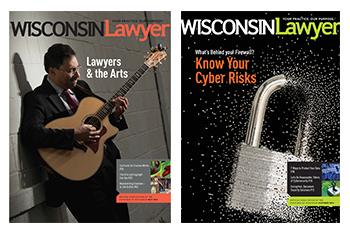 8. Special Focus Issues: Cybersecurity, and Lawyers and the Arts (May, October)
8. Special Focus Issues: Cybersecurity, and Lawyers and the Arts (May, October)
Wisconsin Lawyer had two special focus issues in 2016. The first, in May 2016, covered “Lawyers and the Arts,” with numerous articles on lawyers who are artists, lawyers who practice “arts law,” and the copyright issues involved in protecting artistic expression.
The second, in October 2016, dealt with “Cybersecurity for Lawyers.” This issue hit a number of topics on cybersecurity, including firewalls, cybersecurity ethics, protecting data, and email encryption. Readers also learned about cybersecurity as a niche practice and building a cybersecurity framework for your business.
Top Social Media Posts
These are the top posts that received the most engagement on the State Bar's Facebook, LinkedIn, and Twitter pages in 2016. The posts “went viral,” as the kids say.
1. We celebrated Love Your Lawyer Day in style with this sharable Facebook post. It was seen nearly 37,000 times!
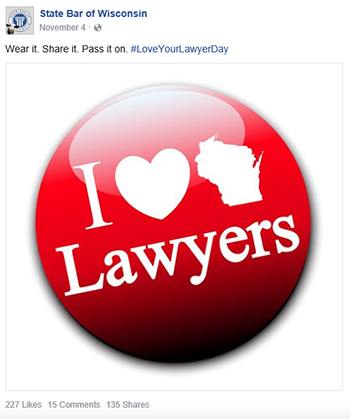
2. Lawyers and lay persons alike helped congratulate former State Bar president Michelle Behnke on her election as American Bar Association treasurer. This LinkedIn post viewed over 10,500 times!
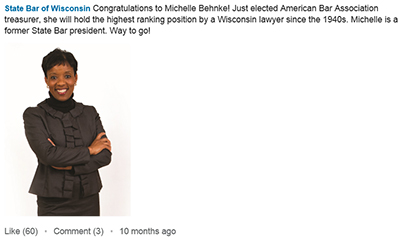
3. We struck a nerve on Twitter with this tweet highlighting Deanne Koll's article exposing stereotypes women lawyer face. It racked up over 100 likes, clicks, and retweets.
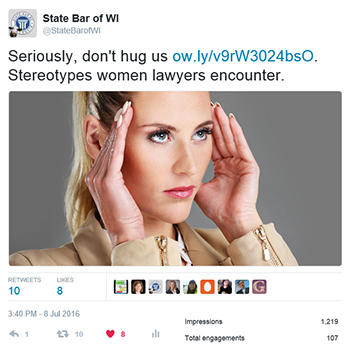
Stay connected with Wisconsin's legal community on social media and join the conversation. Find us on Facebook, LinkedIn, Twitter, and YouTube.
Top Articles in InsideTrack
 9. Law School: Applications Historically Low, Alternative Job Options Rising (September)
9. Law School: Applications Historically Low, Alternative Job Options Rising (September)
Law schools are seeing fewer applications. In fact, in 2014, applications dipped by more than 50 percent at Wisconsin’s two law schools. And a growing number of law school graduates are obtaining so-called J.D. Advantage jobs.
Legal writer Joe Forward spoke with assistant deans at both law schools to shed some light on what’s going on, and what it means for the legal profession. For instance, the article notes that fewer graduates will obtain traditional law jobs.
“A lot of people may end up going into government work,” said an assistant dean at Marquette Law School. “And a number of non-law firm employers, such as accounting firms, are recruiting heavily out of law schools because, as one recruiter told me, ‘it’s easier to teach the numbers to a lawyer than the law to an MBA graduate.'”
 10. New Law Gives Landlords More Tools to Remove Problem Tenants (April)
10. New Law Gives Landlords More Tools to Remove Problem Tenants (April)
Landlord-tenant law is always a hot topic, and Brian Shuk of Wassel, Harvey & Schuk LLP in Delevan was on top of it when the state passed legislation under 2015 Wisconsin Act 176, which included amendments that encourage “crime-free” tenancies.
“Perhaps the most influential revisions of Act 176 are found in the ‘crime-free’ additions,” Schuk wrote in InsideTrack. “These provisions provide methods to protect a landlord’s property and other tenants from a tenant who commits a crime or is involved in a drug-related criminal activity.
“Prior to Act 176, a landlord could terminate a tenancy due to an action of this nature by using a ‘right-to-cure’ notice. However, prior to the landlord serving the notice, the tenant often cured the breach, rendering the notice insufficient.”
 11. Debt Collection: Legislature Moving to Ease Pleading Requirements (January)
11. Debt Collection: Legislature Moving to Ease Pleading Requirements (January)
Consumer law attorneys Mary Fons of Fons Law Office in Stoughton, and Ivan Hannibal of the Consumer Rights Law Office in Madison, watched closely as the state legislature moved to pass legislation impacting debt collection practices. They published a timely article on a proposal to ease pleading requirements in this area.
It’s a must-read for consumer and debt collection lawyers, since the bill became law in March under 2015 Wisconsin Act 155. Commenting on the proposal, they wrote:
“These changes would permit junk-debt buyers to bring claims with little documentation of the alleged debt and remove important protections for consumers currently found in the Act. In addition, the proposed changes would likely increase courts’ workloads amidst an avalanche of junk-debt buyer lawsuits that have been filed the last decade.”
 12. Eminent Domain: Wisconsin Family Cabin Goes to the U.S. Supreme Court (March)
12. Eminent Domain: Wisconsin Family Cabin Goes to the U.S. Supreme Court (March)
The U.S. Supreme Court will soon hear oral arguments in a takings case from Hudson, Murr v. Wisconsin, where the parties will argue the “parcel as a whole” concept and whether two commonly owned lots must be considered a single property for purposes of whether a taking occurred, requiring the government to pay just compensation.
Eminent domain practitioners are closely watching this one. And Sara Beachy of Axley Brynelson LLP in Madison provided a preview of the arguments and what’s at stake.
“The Court could rule on the basis of one of the secondary issues above and never reach the federal takings question,” Beachy wrote.
“The Court could also craft a narrow decision based on the unique facts presented here. But other Wisconsin counties with similar substandard lot regulations are watching the case closely. A decision could also have broader implications for government regulations that limit use of portions of a property.”
 13. After 158 Years, Farewell to the Deadman’s Statute in Wisconsin (November)
13. After 158 Years, Farewell to the Deadman’s Statute in Wisconsin (November)
Wisconsin’s 158-year-old Deadman’s Statute, which bars “interested witnesses” from testifying about communications or transactions with a person who has since died or is no longer competent to testify about it, will take its last gasp in July 2017.
Legal writer Joe Forward explained that the Wisconsin Supreme Court voted to repeal the statute at the request of the Wisconsin Judicial Council.
“The rationale for Wisconsin’s Deadman’s Statute, codified in 1858, was to protect a decedent’s estate from fraudulent claims by living witnesses with an interest in the estate,” Forward wrote, recounting public testimony that the statute is a “malpractice trap,” a “bad rule,” and “long past its time for revocation.”
 14. Q&A with Paul Clement: Top Advocate at the U.S. Supreme Court (May)
14. Q&A with Paul Clement: Top Advocate at the U.S. Supreme Court (May)
Legal writer Joe Forward interviewed Paul Clement ahead of his presentation at the State Bar’s 2016 Annual Meeting and Conference. The former U.S. Solicitor General, who has argued more than 80 cases before the U.S. Supreme Court, had some very interesting things to say about his experiences as one the nation’s top litigators.
“For a U.S. Supreme Court argument, you can’t be over-prepared,” Clement said. “You really want to dedicate a lot of time to mastering the case and the record. For me, a critical part of that is preparing with at least two moot courts. That really helps me streamline and make sure the answers are efficient and accurate.”
Forward also managed to nab a video interview with Clement, a Cedarburg native and a member of the State Bar of Wisconsin. He talks about the late Justice Antonin Scalia. Clement clerked for Scalia after graduating from Harvard Law School.
The Gifts That Keep on Giving
Some articles have a serious lifespan, as in, readers keep accessing the online content year after year. Based on page view stats, staff editors have identified a few of those.
1. Home Safe Home: Wisconsin’s Castle Doctrine and Trespasser Liability Laws. Mark Hinkston of Knuteson, Hinkston & Quinn S.C. in Racine published this article in Wisconsin Lawyer in 2013, after Wisconsin passed legislation. Since that time, it has been accessed more times than any other article the State Bar has published online.
2. Wisconsin’s New OWI Law. Andrew Mishlove and Lauren Stuckert of Mishlove & Stuckert in Milwaukee published this article in Wisconsin Lawyer in 2010. It discusses important changes to state laws on drunk driving. It runs a close second.
3. Hey! That’s My Land! Understanding Adverse Possession. Who knew adverse possession was such a hot topic? But published articles on adverse possession seem to generate a lot of attention. This one, by Jessica Shrestha of Wheeler, Van Sickle & Anderson S.C. in Madison, appeared in Wisconsin Lawyer in 2010. It’s is an all-time great, third on our list.
Top State Bar Section Blog Posts
 15. Driverless Cars are a Clear and Present Danger to Your Bottom Line (November)
15. Driverless Cars are a Clear and Present Danger to Your Bottom Line (November)
Speaking to small-firm, personal injury litigators, Michael Laufenberg, an attorney with Keberle, Patrykus, & Laufenberg LLP in West Bend noted that driverless cars will be on the road in the coming years. That means safer roads and the prevention of countless deaths that would be attributable to negligent driving.
“For society as a whole, this news is very good news,” Laufenberg wrote for the Litigation Section Blog, noting the likely surge in products liability litigation.
“This technology will make our roads much safer for our children and grandchildren. It will also, it seems, permanently alter our roles in the litigation of auto claims/crashes. While some change is always inevitable, this one is truly a game changer.”
 16. Converting Calls to Mediation Clients (December)
16. Converting Calls to Mediation Clients (December)
Lisa Derr, a partner with Derr & Villarreal LLC, based in Beaver Dam, discusses the key components of successfully converting phone calls into paying clients. This practical article targets mediators but her tips could easily apply to lawyers in any practice area.
“In my experience, clients want at least a general explanation of mediation,” Derr wrote for the Dispute Resolution Blog. “But most people do not want that immediately. In fact, they need to discuss their problem first. We try to follow the general rule not to discuss any details of the process until we are asked.”
The Benifits of Writing for Wisconsin Lawyer or InsideTrack: Establish Your Reputation, Earn CLE
Back in 2007, law firm marketing consultant John Remsen Jr. discussed how writing bylined articles can help lawyers build a practice and act as a marketing tool. This is what Remsen said:
“Most law firm marketing experts agree that bylined articles are an extraordinarily effective way to establish your reputation as having expertise in a particular area of law. For best results, your article should appear in a well-respected publication read by people who have the decision-making ability to hire and refer you.”
Larry Bodine, a legal marketing strategist, said the same thing in 2016: “The best way to compete with million-dollar advertising budgets is to write a blog. Writing online about your area of expertise creates a lasting asset. The same logic applies to writing for online publications and websites. Your new clients will be attracted to it when it first goes online, and future clients will find and read it years from now.”
The State Bar’s online publications provide lawyers with an opportunity to highlight their expertise on a major platform, the State Bar of Wisconsin’s website. With around 5.5 million page views annually, the potential for broad dissemination to the legal community is clear.
And when you write for the State Bar, your article is also bound to appear in one of its social media channels, creating more visibility for your firm and your business. If that isn’t enough, attorneys can also earn CLE credit for publishing articles for the State Bar.
Do you want to write for the State Bar? Have an idea? Check out the writing guidelines for Wisconsin Lawyer and InsideTrack. Do you want to talk to an editor?
For InsideTrack, contact legal writer Joe Forward by email or phone at (608) 250-6161. For Wisconsin Lawyer, contact managing editor Karle Lester by email or phone at (608) 250-6127.
Write for a State Bar Section Newsletter or Blog
If you are member of a State Bar section, there are also opportunities to write for a section newsletter or blog. Some of them actively publish newsletters specific to certain areas of law.
The State Bar also offers blogs as a new communications tool. Some sections have replaced their traditional newsletters with blogs as a faster way of communicating developments. Currently, eight sections are blogging on the new section blogging platform.
Questions? Contact section coordinator Megan Kenney by email or phone at (608) 250-6190.
